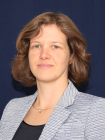Boost to fundamental research on logistics, sustainability and energy at University of Groningen

The Netherlands Organisation for Scientific Research (NWO) and the Knowledge and Innovation Top Consortium (TKI) Dinalog have awarded € 1.18 million to two Groningen research projects (Towards virtual ports in a physical internet and Adaptive Logistics in Circular Economy? )
These projects have been awarded funding from the NWO Vital Logistics research programme , which contributes to the objectives of the logistics top sector and aims to develop, share and apply the new knowledge needed to boost long and medium-term vitality in the Dutch logistics sector. A total of 5 projects for fundamental research were awarded funding. The funding constitutes an important boost to the strategic research fields logistics, sustainability and energy at the University of Groningen.
Ports in a Physical Internet
The project entitled Towards virtual ports in a physical internet, being carried out by researchers Iris Vis, Kees Jan Roodbergen, Paul Buijs, Leandro Coelho (all from the University of Groningen/Operations), Lori Tavasszy (TU Delft) and corporate partners Groningen Seaports and the Port of Rotterdam, has a total budget of € 591,000. The project revolves around the role of ports in the Physical Internet initiative. To use analogy with sending e-mails through the digital web, the Physical Internet (PI) is based on universally interconnected, open networks of logistic services, in which physical goods are moved around, stored, delivered and used. PI can be seen as an expansion of the current synchromodal approach, by making real-time decisions about routes, choice of transport and transhipment location of sea containers and their contents. In addition to conceptual research into the role of ports in PI, the project also involves developing decision-supporting systems for logistic operations in ports and their hinterland. This is the first Dutch research project studying PI, and is widely considered to be the world’s first project to focus primarily on the role of ports within PI networks.
Adaptive Logistics in Circular Economy?
(ADAPNER)
Researchers Hans Wortmann, George Huitema and Gerard Dijkema (all from the University of Groningen) and partners Holthausen and Gasunie were awarded funding for the ADAPNER project with a total budget of € 588,500 for a period of four years. Biomass plays a key role in organic food production and as a raw material for biogas. Without subsidies, biogas is not currently cost-effective in the Netherlands, mainly because of the costs of logistics. At present, transporting biomass, biogas and digestate is too expensive to guarantee a viable circular economy for biogas. This project focuses on realizing economic feasibility by developing new technologies and organization models in this area.
| Last modified: | 31 January 2023 2.53 p.m. |
More news
-
19 April 2024
New thesis prize for master's students of Economics and Business
How can we encourage economics and business students to deal with important societal challenges in their master's thesis? The 14 Dutch faculties of economics and business, united in the Council of Deans in Economics and Business (DEB), have set up...
-
18 April 2024
Ward Romeijnders appointed as Professor of Optimization under Uncertainty
The Faculty of Economics and Business is pleased to announce that Ward Romeijnders has been appointed as Professor of Optimization under Uncertainty. The chair is situated within the Department of Operations.
-
12 April 2024
Inaugural Lecture Corine Noordhoff: Future ready retail
In her inaugural lecture, Professor of Retail Marketing Corine Noordhoff will provide insights in the cornerstones for survival and adaptation in the retail sector. Noordhoff’s inaugural lecture will take place on Friday 19 April 2024, 16:15 –...
